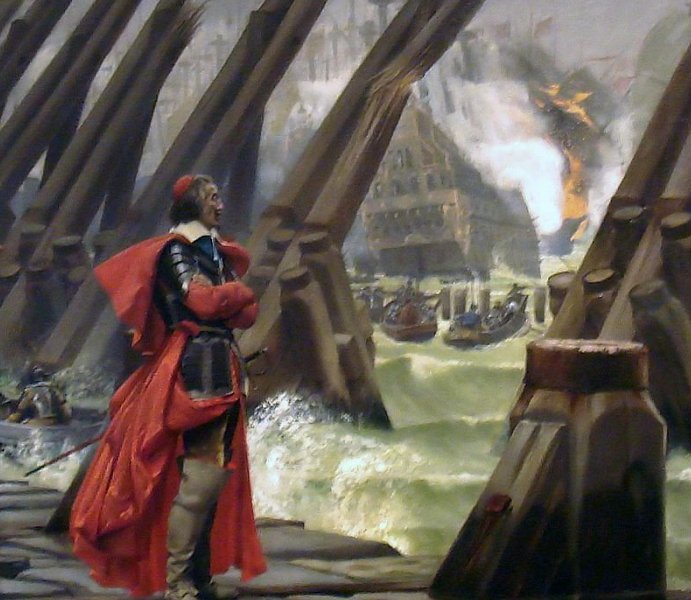Cardinal Richelieu ‘Red Eminence’ – One Of The Greatest Politicians In French History
A. Sutherland - AncientPages.com - Cardinal Richelieu (1585-1642) known as the "Red Eminence" was a political genius and a French statesman who created the power of France and absolute monarchy. He was Cardinal from 1622 and Duke of Richelieu and Fronsac from 1631 and the one who broke the power of the Huguenots (French Protestants) who followed Calvinism.
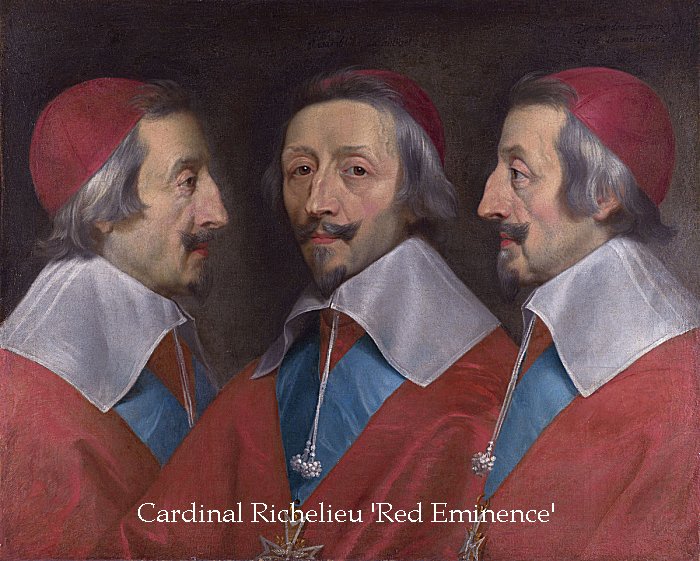 Image credit: Philippe de Champaigne - National Gallery - Public Domain
Image credit: Philippe de Champaigne - National Gallery - Public Domain
He introduced France into the Thirty Years' War hoping that after its end, the King of France will be the ruler of neighboring countries. He believed that the king had the divine right to promote peace and order in society. Richelieu followed the maxim that "the ends justify the means."
He had the ability to find himself in the right place and time, a gift, which usually people’s careers relied on.
One Goal, Tough Methods
Richelieu had one and clear goal - the monarchy and he had huge ambitions to achieve far-reaching power.
Undoubtedly, he was a person, with extraordinary ability to analyze all the circumstances of the political game very quickly and to draw right the conclusions. In fact, in Richelieu’s biography, there are not many tactical decisions that could be questioned.
Career Was Fast
Richelieu was the third son of the Lord of Richelieu. He was not a rich man and at first, he only administered a small and poor diocese. This man thanks his brilliant brain and extraordinary abilities come to dominate France from 1624 to 1642.
In 1606, Richelieu was appointed by King Henry IV bishop of Luçon and in November 1616, he entered the Royal Council as head of the diplomacy. He was an educated, handsome, elegant, eloquent 31 years old bishop and politician who had good relations with everyone around him, including Louis XIII, important princes, and other prominent figures, the Paris Parliament.
In 1622, thanks to the protection of Louis XIII's mother, Marie de Médicis, Pope Gregory XV appointed him Cardinal.
As early as in 1624, he was appointed by Louis XIII as the prime minister of France. He became a prominent figure in French politics and skillfully faced the atmosphere of plots, intrigues, and political maneuvers of all kinds.
He soon began to overcome many political adversities. His intellect was powerful, analytical and largely relied on reason, strong will, and the ability to rule others. Richelieu used political power very effectively, but it was not an easy task.
He was subjected to terrible pressure and intrigues within the country and external enemies. Richelieu had many enemies who tried (though unsuccessfully) to harm him. A dozen conspiracies and plots have been tied to the cardinal's life but he managed to calm everyone.
Henri Motte's depiction of Cardinal Richelieu at the Siege of La Rochelle. Image credit: Henri-Paul Motte - Musée d'Orbigny Bernon - Public Domain
He had to conduct foreign policy towards about 65 hostile and foreign political subjects and some hostile rebel national centers. It required extraordinary political skills to win with them and most of time, Richelieu succeeded. His central power center in Paris had only commanding messengers carrying out orders.
Most important letters were encrypted by his office that could also broke other codes. The cardinal also invented the first real political newspaper.
Defeat Of The Huguenots And Granting Of Freedom Of Religion
In the years 1625-1628 he waged war against the Huguenots, one of the main forces opposed to the king.
Having defeated the Huguenots in 1629, he issued an edict of grace that ordered the Huguenots to resign from political independence and give back fortresses, but at the same time he guaranteed freedom of religion. On November 11, 1630 he was appointed Minister of France.
Strengthening Absolutism And Weakening Of Aristocratic Power
Without mercy, he broke the nobility's opposition. He introduced a number of reforms including weakening the position of the aristocracy. In 1630, he forbade the aristocrats to trade, and shortly thereafter, he forbade them to conduct private wars and to have fortified castles (existing ones were to be bought out).
His Accomplishments For France Were Significant
Richelieu is considered one of the creators of the strong royal authority in France. He reformed the country’s navy and army. He also defeated rebellions and advanced royal absolutism. He wanted to make France the greatest power in Europe using his tough and ruthless but apparently efficient methods.
It was said that people either liked Richelieu or hated him, there was no other alternative.
Weakening Health And Death
In November 1642, he fell ill. He died on the 4th December 1642. Before his death, he wrote to Louis XIII:
"I have the consolation of leaving your kingdom in the highest degree of glory and of reputation."
Patience and stubbornness were one of the cardinal's political weapons. Dying, advised by his confessor to forgive all his enemies, he declared: "I have no enemies but France has many enemies."
Written by – A. Sutherland - AncientPages.com Senior Staff Writer
Copyright © AncientPages.com All rights reserved. This material may not be published, broadcast, rewritten or redistributed in whole or part without the express written permission of AncientPages.com
Expand for referencesBurckhardt Carl J. Richelieu: His Rise to Power
Blanchard J-V. Éminence: Cardinal Richelieu and the Rise of France
More From Ancient Pages
-
 Mysterious 7,000-Year-Old Circular Structure Near Prague Investigated By Scientists
Archaeology | Sep 14, 2022
Mysterious 7,000-Year-Old Circular Structure Near Prague Investigated By Scientists
Archaeology | Sep 14, 2022 -
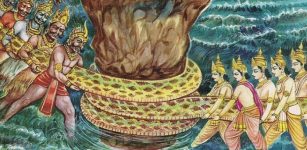 Churning Of The Ocean: Great Hindu Story Of Creation From Mahabharata And Purana
Featured Stories | Jun 16, 2018
Churning Of The Ocean: Great Hindu Story Of Creation From Mahabharata And Purana
Featured Stories | Jun 16, 2018 -
 Unexplained Disappearance Of East Balkan Civilizations – Discovery Of Unusual Mini Artifacts – Part 1
Ancient Mysteries | Apr 28, 2018
Unexplained Disappearance Of East Balkan Civilizations – Discovery Of Unusual Mini Artifacts – Part 1
Ancient Mysteries | Apr 28, 2018 -
 Unique, Well-Preserved 4,000-Year-Old Boat Discovered Near The Ancient City Of Uruk
Archaeology | Apr 4, 2022
Unique, Well-Preserved 4,000-Year-Old Boat Discovered Near The Ancient City Of Uruk
Archaeology | Apr 4, 2022 -
 Ancient Mysteries Of Japan – Remarkable Story Of An Unknown Civilization And Lost Knowledge – Part 2
Ancient Mysteries | Sep 2, 2019
Ancient Mysteries Of Japan – Remarkable Story Of An Unknown Civilization And Lost Knowledge – Part 2
Ancient Mysteries | Sep 2, 2019 -
 Unusual Discovery Of A Viking Age Phallic Stone In Tystberga, Sweden
Archaeology | Jun 12, 2023
Unusual Discovery Of A Viking Age Phallic Stone In Tystberga, Sweden
Archaeology | Jun 12, 2023 -
 Native American Legend Of Apotamkin Teaches Children Obedience
Featured Stories | May 14, 2019
Native American Legend Of Apotamkin Teaches Children Obedience
Featured Stories | May 14, 2019 -
 Unique Ancient Coast Salish War Club Accidently Discovered In British Columbia Backyard
Archaeology | Mar 22, 2022
Unique Ancient Coast Salish War Club Accidently Discovered In British Columbia Backyard
Archaeology | Mar 22, 2022 -
 Viking House The Size Of Two Tennis Courts Discovered In Norway
Archaeology | Jul 20, 2023
Viking House The Size Of Two Tennis Courts Discovered In Norway
Archaeology | Jul 20, 2023 -
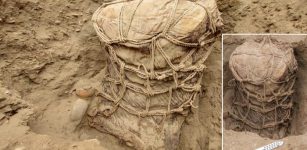 A 500-Year-Old Funerary Bundle And Pottery Probably Belonging To Ychsma Culture – Unearthed Near Lima, Peru
Archaeology | May 22, 2023
A 500-Year-Old Funerary Bundle And Pottery Probably Belonging To Ychsma Culture – Unearthed Near Lima, Peru
Archaeology | May 22, 2023 -
 On This Day In History: Thor Heyerdahl Sails From Morocco On Papyrus Boat Ra II To Barbados – On May 17, 1970
News | May 17, 2016
On This Day In History: Thor Heyerdahl Sails From Morocco On Papyrus Boat Ra II To Barbados – On May 17, 1970
News | May 17, 2016 -
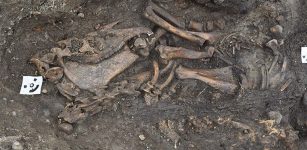 Two Rare Full-Sized Viking Burial Ships Uncovered In Sweden
Archaeology | Jul 5, 2019
Two Rare Full-Sized Viking Burial Ships Uncovered In Sweden
Archaeology | Jul 5, 2019 -
 Mysterious Ancient Tomb Reveals ‘Impossible’ Human Connection To Cosmos – Human Anomaly? – Part 2
Ancient Mysteries | Oct 15, 2020
Mysterious Ancient Tomb Reveals ‘Impossible’ Human Connection To Cosmos – Human Anomaly? – Part 2
Ancient Mysteries | Oct 15, 2020 -
 Ancient Manuscript And Controversial Ancient Book Shed New Light On The Mystery Of The Toltecs
Ancient Mysteries | Sep 9, 2018
Ancient Manuscript And Controversial Ancient Book Shed New Light On The Mystery Of The Toltecs
Ancient Mysteries | Sep 9, 2018 -
 Ancient Mayans Used Saunas For Healing Purposes
Ancient History Facts | May 12, 2016
Ancient Mayans Used Saunas For Healing Purposes
Ancient History Facts | May 12, 2016 -
 Antediluvian Artifact Discovered In Egyptian Tomb May Solve The Great Pyramid Mystery?
Ancient Mysteries | May 3, 2018
Antediluvian Artifact Discovered In Egyptian Tomb May Solve The Great Pyramid Mystery?
Ancient Mysteries | May 3, 2018 -
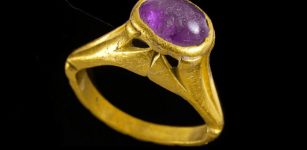 Ancient Greek Amethyst Ring To Ward Off A Hangover Discovered At The World’s Largest Byzantine Wine Factory In Yavne, Israel
Archaeology | Nov 12, 2021
Ancient Greek Amethyst Ring To Ward Off A Hangover Discovered At The World’s Largest Byzantine Wine Factory In Yavne, Israel
Archaeology | Nov 12, 2021 -
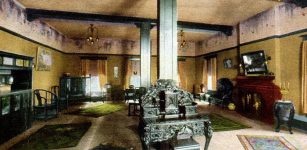 Archaeology Illuminates Chinese Businesses In Eugene
Archaeology | May 23, 2022
Archaeology Illuminates Chinese Businesses In Eugene
Archaeology | May 23, 2022 -
 Denisovan DNA Found In The Genome Of Oldest Human Fossil Discovered In Mongolia
Archaeology | Oct 30, 2020
Denisovan DNA Found In The Genome Of Oldest Human Fossil Discovered In Mongolia
Archaeology | Oct 30, 2020 -
 Mysterious 2,000-Year-Old Disco Colgante – Unknown High-Tech Device, Representation Of A Spiral Galaxy Or Something Else?
Artifacts | Nov 20, 2020
Mysterious 2,000-Year-Old Disco Colgante – Unknown High-Tech Device, Representation Of A Spiral Galaxy Or Something Else?
Artifacts | Nov 20, 2020

